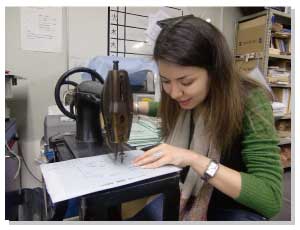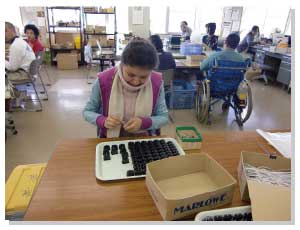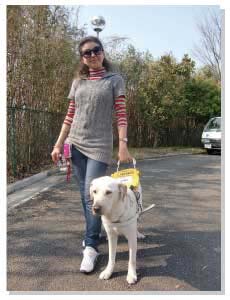- HOME
- Alumni News
- Olesya Narmuratova (11th trainee)
- Olesya's Final Report
Olesya's Final Report
Before coming to Japan
For people in my country, and others from Central Asia, going to Japan is something like a dream. Ever since I learned about Japan at the geography class in my junior high school, I had always been interested in Japan. The culture and environment in Japan seemed vastly different from that of Central Asian countries.
I could not believe my luck when I was chosen to be one of the trainees, out of 300 applicants last year. I had never dreamed that I could have an opportunity to study in Japan. Even when I set foot in Narita Airport, even when I met Akiko-san at the airport, it still felt like a dream.
Opening ceremony
At the opening ceremony, I met up with six other “mysterious” trainees from other countries. Mysterious, because I did not even know until then, what they looked like or who they were. At the ceremony I met a number of people with disabilities. Unfortunately people with disabilities in my country rarely go out. At the opening ceremony I could hardly carry a conversation with the people because I did not even know basic Japanese.
Life in Japan and Japanese language training
After the opening ceremony, we went back to Tokyo for the Japanese language training program. I knew that since I was in Japan I would really have to work to learn Japanese. But I had such a tough time for the first two to three weeks after arriving in Japan, because I was far from family and friends and I missed them badly. Gradually, I got used to the life in Japan, and I became friends with the other six trainees. We started going out every evening to have dinner together. At first, it was so hard to learn Japanese. The grammar and characters were totally different from my language. But I gradually became fond of the language, as I loved studying new languages. The lessons were very interesting. The teachers had a different teaching style from ones in my country; they taught words and phrases as if it was a game. I began to be able to communicate with the staff at supermarkets and railway stations, and felt delighted. I am very grateful to my Japanese teachers.
Swimming
Once a week we had swimming lessons. Before coming to Japan I could not swim at all. Thanks to the disciplinary teaching by my coaches, I eventually got rid of my fear of water. They also taught me how to take breath in the water and how to move my arms and legs.
Home-stay program
It was going to be the first New Year Holiday ever without my parents, but I was glad to hear that for my home-stay program, I would have the opportunity to stay with a Japanese family in Okinawa. Okinawa has a very temperate climate, and the home of my host family Mr Nakamoto was very warm, and cozy. The family was so kind to me. They took me to a variety of sites of interest, including Shuri Castle and Okinawa Chura Aquarium. I saw the ocean for the first time in my life. My “mother” of Okinawa, Makiko-san, put me in a kimono to visit a Shinto shrine together. I got gazed at by a lot by passers-by, as I (a foreigner) was in a kimono, with sunglasses on. It was so wonderful to stay in Okinawa. I took nearly a thousand pictures.
Skiing
After the warmth of Okinawa, was the cold of Niigata, for skiing. We have a lot of mountains in Tajikistan and also ski resorts, but I had never skied. I thought that I would never be able to ski given my visual impairment. Besides, there are no good ski instructors in Tajikistan. I was so concerned about falling over and breaking my bones, but there was a teacher assigned to every trainee. My teacher Miho Sensei (teacher) paid utmost attention to guide me, so I only fell over once. Skiing has become an unforgettable experience.
Individual training
1. Social Welfare Juridical Person Light Friend Association
The individual training started off at Light Friend Association in Kanagawa Prefecture. During the training, I visited a number of welfare institutions for people with disabilities. It was a learning experience as an introduction, for me to have a better understanding of Japanese welfare system and facilities. I had a better understanding of the Association after Ms Igarashi told me about their history and activities. I also experienced working with people with various disabilities, and also visited a blind school in Kanagawa Prefecture.
2. Nippon Lighthouse Welfare Center for The Blind
I then went to Nippon Lighthouse in Osaka for the second individual training program. I learned an easy way to produce a DAISY book and about volunteering of book recording and editing. Mr Takeshita taught me many important things. I also visited Rehabilitation Center of Visual Impairment, and a guide dog training facility within Nippon Lighthouse. I had a great experience at the guide dog center. There are no guide dogs in Tajikistan. I blindfolded myself and walked with a guide dog, but as I did not know how the dog was going to guide me, I was a bit scared at first. After a while though, the fear vanished, because I learned that I had simply to rely on the dog. The dog was so wise and professional.
At the rehabilitation center, I met many people with visual impairment, and also made many friends. They did not know about Tajikistan, so they were very keenly interested. At weekends, I went to Osaka Castle and Universal Studio with friends. Also Mr. Takeshita took me to an old Buddhist temple in Kyoto.
3. DAISY training
After Osaka, I went back to Tokyo for the DAISY training, and visited the ATDO (Assistive Technology Development Organization) office every day. Everyone at ATDO had a great sense of humor. At ATDO, I studied further about how to produce DAISY books. For three weeks I used a variety of software to record and edit DAISY books, and also recorded DAISY textbooks in English for Japanese children with disabilities. It was a good exercise. Mr. Fujimori taught me how to use DAISY PTP (Portable Player). The DAISY training was the most important training for me. Thanks to Mr. Kawamura and Ms. Hamada’s guidance, I finally came to understand that DAISY is important and necessary for Tajikistan.
4. Okinawa Welfare Association for the Visually Impaired
The chairman and staff of Okinawa Welfare Association for the Visually Impaired came to Naha Airport to greet me. The day I arrived, coincided with the start of the rainy season; so for the first week of the training it was rain, rain, rain every day. I had never seen so much rain. I would get soaking wet, just walking from my hotel to the restaurant which was only 3 minutes away on foot.
Up until then, I had thought the Nippon Lighthouse’s training was the hardest, but the training in Okinawa was even harder. Luckily for me every staff members kindly coordinated everything to make my training useful and worthwhile, so I tried to work hard to meet their expectations. Mr. Toguchi told me about his own work and experience, and took me to many organizations for people with disabilities. I experienced acupuncture at a massage center, and also visited Okinawa Prefectural School for the Blind where Mr. Nakamoto, the father of my host family, worked. As I work for a school for the blind in Tajikistan, I was happy to have an opportunity to learn about a blind school in Okinawa.
I also had an opportunity to get in touch with Okinawa’s culture and history, experiencing the traditional dance of Okinawa, and musical instrument Sanshin. I was also taken to the area where war was fought in Okinawa, which taught me about the tragedy of war where many people were sacrificed. This helped to deepen my understanding of Okinawa.
There is a barrier-free diving shop in Okinawa. I experienced scuba diving for the first time in my life. The ocean was so beautiful. It was a clear, beautiful day, and I saw colorful fish everywhere. It felt wonderful.
Though Okinawa was a tiny island there were many institutions for people with disabilities. I had so many wonderful experiences in Okinawa. It taught me that Okinawa is a place, where there is no “impossible” as long as there is a will, despite disabilities.


Summary
I will miss my Japanese friends and peers. The one-year training was so short. But one can always learn; I would like to continue to learn, to change Tajikistan’s society and the government’s view on people with disabilities. Of course I cannot do anything alone, so I will have to cooperate with other organizations of/for people with disabilities to negotiate with the government. I would like to commence a project in Tajikistan, to create and distribute DAISY publications. I would also like to establish a massage center. Because of my experience of learning about welfare for people with disabilities in Japan, and because I visited many organizations, I have many ideas for the future. I will work to the best of my abilities to change the society!





